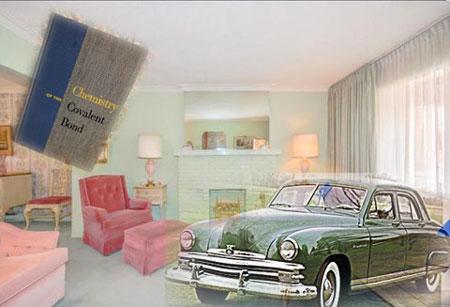The next morning, I was up early to get to my eight-o’clock Calculus class. I had already completed the assigned problems the previous evening, after my parents got tired arguing and went to bed. Father had already taken the bus downtown, and as usual, Mother stayed up to fix breakfast for me. Thus, I was nourished with eggs, toast, and coffee when I said good-bye to her and hurried out the door.
As I walked along the main road, my tweedy car coat warmed me. A mid-November snow was quietly falling and just beginning to accumulate—on the ground and on my car coat. I was waving my thumb at the morning traffic, when that green Kaiser happened by. Mary was driving, of course, but she wasn’t alone. A young man, neatly clipped and jacketed, sat beside her. I had seen him on campus but had never spoken to him. Mary gave me a quick glance—that was all—and kept on going. But soon enough, another student stopped and offered me a ride. He was my partner in the Physics Laboratory course, and we both got to school on time for the Calculus class, though I remained a bit stung by Mary’s indifference.
Yet I had more pressing worries. I had worked for a year before entering college, accumulating enough money to pay early tuitions. Now, I had to think about finding summer work, and whether to choose advanced ROTC, which would pay me, but commit me to military service. And I had to do well in my Organic Chemistry course—three lectures and two long laboratories a week.
Thus, one crisp early-December evening, I was back on the road and under the stars. I walked briskly, raising my thumb to an occasional passing truck or car, when that familiar Kaiser came along. Mary was driving alone and pulled over. Once again, I climbed into that curious vehicle, a model now gone and forgotten, and away we went.
“So—what’s new?” she said, as her socks moved along the floorboard.
“Not much—I just left the Organic lab.”
“What kept you?”
“I was running a Grignard reaction. It took me a while to get it started—what kept you?”
“Extra studying—I’m writing a term paper for the honors program. Do you still want to study together?”
“Would it trouble you?”
“No, not at all—I did suggest it.”
I was still uneasy about that young man I saw sitting next to her—and about her ignoring me on that snowy day. If I became too familiar with Mary, would a complication arise?
“I live on Hermes Road,” she said. “Do you know where it is?”
“Yes.”
“My address is in the book. We can study at my house—anytime.”
I was stunned by her persistence. Was I possessed of some sort of magnetism, some attraction, of which I wasn’t aware?
“That would be nice,” I said meekly.
“Do you have a car at home?”
“No—I don’t.”
Ah, that was more evidence of my impecunious condition. But I might add that, in those days of the Fifties, modesty of means propelled scores of young people toward the higher learning at my humble land-grant college. Dormitory fees were much higher than the tuition. Hence, many students, even some with well-to-do parents, took to living at home and commuting to school. Some drove, or rode with another student, and some few hitchhiked as I did.
“I can pick you up,” she said. “It wouldn’t be any trouble.”
“Oh—uh, all right.”
It did seem odd—why was she so anxious to have me study with her? She was pretty and jolly, and at the time, I was the very soul of diffidence. Still, she did come by my house in that silly Kaiser. This was on a Friday evening, a few days later. In those innocent days, there were Saturday classes, and Friday nights were often study nights. It was just after dinner that she honked the horn. Father was sitting and reading a newspaper in the living room. The house was blessedly silent, and the cat was dozing on the hassock.
“Dad,” I said, as I was leaving. “I’m going to study at Mary’s house.”
“Mary?—who’s she?” he replied, looking at me over his glasses.
“A classmate—she suggested we study together.”
“Oh—sort of a study date.”
Mother was in the dining room, changing the tablecloth, and overheard our exchange.
“Billy,” she said, “don’t you go running off to Elkton to get married.”
“Of course I won’t.”
Mother leaned toward negativism—always concerned over potential disasters, though at the time, I wouldn’t have considered marriage to Mary a disaster. I left the house in my usual car coat, flannel shirt, khaki work pants, and soiled shoes, and Mary and I rode to Hermes road. The houses there were a step or two above mine. Her parents owned theirs, paying off a mortgage, rather than renting as my parents did. Her father was a plumber, a well-rewarded trade, even in those days. There was a twenty-inch television set in the living room, among other luxuries. A preserved marlin hung over the mantle—a chance catch in Delaware Bay. Mary had two brothers, both away in the military, one in the Army, the other in the Navy. Pictures of them, in uniform, smiled from the wall.


